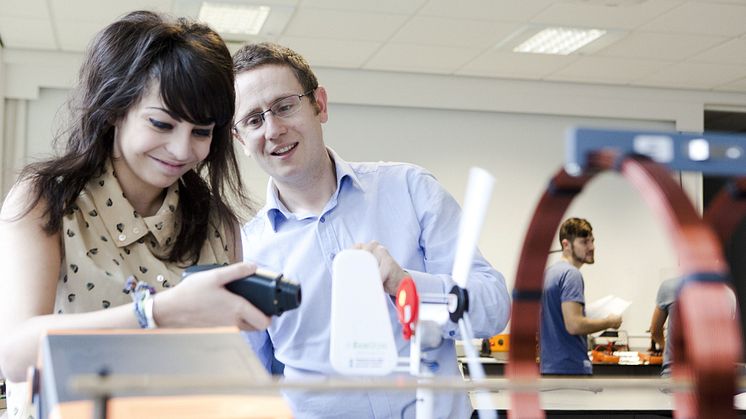
Press release -
Science students discover a bright future in new physics lab
Whether it’s measuring the speed of light or searching for planets capable of supporting life, Northumbria University’s new physics and astrophysics students will be at the cutting-edge of science thanks to investment by the Faculty of Engineering and Environment.
The new laboratory at Northumbria’s city centre campus in the heart of Newcastle has been created to enhance the experience of new students on Northumbria’s physics programmes, BSc. (Hons) Physics, and BSc. (Hons) Physics with Astrophysics – the only undergraduate physics courses available in Newcastle.
Science has undergone a cultural renaissance in recent years and physicists are in high demand across business and industry. Northumbria has recognised this by investing in world-class facilities that will ensure graduates develop the practical skills and innovation to hit the ground running with employers when they leave the University.
Dr Neil Beattie, Senior Lecturer and Physics Programmes Leader in Engineering and Environment, said: “Northumbria’s students develop key skills such as the ability to problem solve, create mathematical models, write computer programs and handle uncertainty, which provide them with excellent employment prospects across a diverse range of careers.
“Our new physics laboratory provides Northumbria’s physics students with a fantastic learning environment that will enable them to explore and discover. Doing experiments is a key part of studying physics and working in our new physics laboratory allows students to investigate fundamental phenomena.”
Physics has seen a huge resurgence in popularity in recent years thanks in part to TV shows such as the BBC’s Wonders of the Solar System series, but also to scientific breakthroughs such as the development of Cern’s Large Hadron Collider in Switzerland and the discovery of the Higgs boson, based on theory by Newcastle-born Prof Peter Higgs, who was jointly awarded the Nobel Prize for Physics earlier this month.
Northumbria’s programmes are closely aligned with the University’s research strengths in astroparticle physics, condensed matter, mathematical physics, optical communications, photovoltaics, soft matter, and solar physics.
In the new laboratory students have the opportunity to perform important experiments in quantum physics, thermodynamics, atomic physics, mechanics and electromagnetism. In addition they also explore contemporary problems such as identifying exoplanets from real satellite data or assessing sources of renewable energy.
Dr Beattie added: “What’s great about physics is that on one hand it allows you to understand the origins of the Universe, while on the other it allows you to tackle diverse problems from climate change to healthcare.”
Northumbria will showcase its campus and courses to prospective students during its Open Day this Saturday, October 26th from 10am-3pm. Prospective students and their families can either register online or turn up on the day. For more information, visit www.northumbria.ac.uk/opendays.
Date posted: October 24, 2013
Topics
Categories
Northumbria is a research-rich, business-focussed, professional university with a global reputation for academic excellence. To find out more about our courses go towww.northumbria.ac.uk
If you have a media enquiry please contact our Media and Communications team at media.communications@northumbria.ac.uk or call 0191 227 4571.






